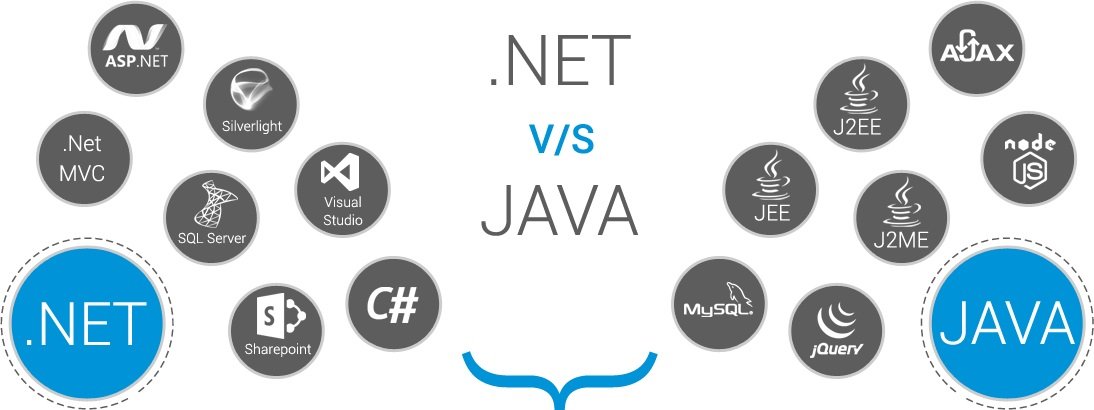.NET and Java are two popular technologies for building software, web apps, and websites. Both allow large-scale applications to be made using high-level programming languages. As we can use both Java and .NET to achieve the same development goals, there is sometimes confusion about which technology is being used.
You need to learn about the applications made using either of the technologies. We are going to highlight the difference between Java and .NET, we aim to assist businesses in understanding how either of the technologies could fit their operational needs.
Let’s see what impact these two technologies have in the software industry
What is .NET?
.NET is an open-source development platform by Microsoft to make end-to-end applications. One can develop web-based applications, mobile apps, desktop applications, cloud, and IoT. It is basically a bunch of tools like ID which eases your languages and your libraries, and all these tools, IDEs, languages, and libraries combine to form a .NET framework.
Benefits of .NET framework:
Now let’s discuss the different benefits of the .NET framework:
- Robust:
One of the first benefits of the .NET framework is that it is incredibly robust which means that whatever code or software you are developing by using this framework will be very polished and would have less amount of crashes possible. Additionally, it also has a robust caching system.
- Security:
.NET provides security scope for the software that is being developed.
- Fewer Memory Leaks:
Moreover, it also helps in minimizing memory leaks as much as possible. It can do so because of the .NET common language runtime; the CLR provides a managed environment where a garbage collector maintains the memory; therefore, it has minimum memory leaks.
What is Java?
Java is a programming language developed by Sun Microsystems to permit software developers to make web-based applications and other software. Many applications and websites would not work unless Java is installed.
Benefits of Java:
Now let’s discuss the different benefits of the Java programming language.
- Secure & Dependable:
Java is a secure, dependable, and quick programming language and might be found all around, from laptops to datacenters, game consoles to scientific supercomputers, and cell phones to the internet.
- Effectively creates Programming Applications:
Java enables programmers to create and run Java programming applications effectively. It also contains an execution engine, a compiler, and a collection of libraries.
You now have a deep understanding of Java and .NET, so look at the comparison between Java vs. .NET
Fundamentals:
- .NET is a free, cross-platform, open-source framework for developing several applications. Microsoft started creating the .NET framework in the late 1990s, and the first beta versions of .NET 1.0 were released in early 2000.
- Java is a programming language and computing platform made by Sun Microsystems and was released in 1995. Java is a famous object-oriented programming language and software platform utilized on billions of devices like notebook computers, mobile devices, gaming consoles, medical equipment, and much more.
Languages:
- You can utilize multiple languages with .NET and applications can be written in c#, F#, or visual basics.
- Java is a programming language itself, however, JVM (Java virtual machines) supports other languages like Python, R, Rexx, and Ruby.
Operating System:
- .NET functions on Windows operating system, Windows 98 or later, Windows NT 4.0.
- Java could run on many operating systems, involving Microsoft Windows, Solaris, Linux, and macOS.
IDEs:
- In .NET IDE’s such as atom, brackets, sublime text, emacs, and Vim are used and the most common one is Visual Studio.
- Java uses IDEs like eclipse, blueJ, intelliJ IDEA, Jgrasp, JCreator, NetBeans, Greenfoot, and JDevelop.
Performance:
- .NET makes the use of compiled languages like C# and C++. They are quicker and use less memory than Java. .NET also allows for code optimization and writing less code which makes the performance better. You just need a dot net development company and you will be good to go.
- Java’s performance is partly due to its (JIT) Just-in-time compiler and concurrency features. Additionally, the Java Virtual Machine instantly executes the compiled code (JVM. Compiling does not take any processing time or memory because the code is not interpreted. As a result, Java applications run at the same speed as native applications.
Final Thought:
Java ranks number 1 in all the ratings, and it is highly competitive in the job market, whereas .NET is an open-source, object-oriented solution used for developing all types of applications. It also has a clear roadmap for the future

